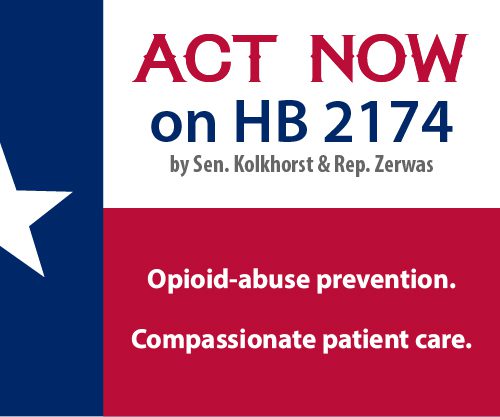
Sensitive to chronic pain treatment, this bill in the Texas Legislature by Sen. Lois Kolkhorst and Rep. John Zerwas, M.D. would prevent addiction and keep opioids from the wrong hands.
The bill would limit the supply of a patient’s first opioid prescription to 10 days, when that prescription is for temporary, or acute, pain. This limit does not apply to ongoing, or chronic, pain. It does not apply to cancer care, to treatment of other illnesses, nor to end-of-life care.
The bill also would require electronic prescribing for controlled substances, to help prevent fraud and abuse.
Advocated by:
Alliance of Independent Pharmacists
Texas Federation of Drug Stores
Texas Independent Pharmacies Association
Texas Pharmacy Association
Texas Pharmacy Business Council
National Association of Chain Drug Stores
Op-ed: Texas needs this opioid-abuse-prevention bill now
“We see a tremendous opportunity right now in the Texas Legislature to help solve the opioid abuse epidemic, while remaining sensitive to those suffering with chronic pain…
“Based on daily engagement with patients across Texas, based on our ongoing collaboration with law-enforcement, and based on pharmacists’ extensive education and experience, we know this legislation would help protect Texans, and would start doing so as soon as it went into effect.”
– Ken Breda, Director of Pharmacy, Brookshire Brothers; President, Texas Federation of Drug Stores
THE ATTORNEY GENERAL’S PERSPECTIVE
Texas Attorney General Ken Paxton characterized the bill as a “crucial tool in the fight against opioid abuse, which would significantly reduce initial opioid addiction and also prevent most fraudulent prescriptions of opioids.” He said HB 2174 “will have an immediate positive impact on families through reduced opioid abuse in Texas.”
THE FACTS: ELECTRONIC PRESCRIBING
THE FACTS: SUPPLY LIMITS FOR TEMPORARY PAIN
BACKED BY TEXAS VOTERS
63% support mandatory e-prescribing;
17% have no opinion yet;
and only 20% oppose
58% support supply limits for temporary pain;
17% have no opinion yet;
and only 25% oppose
ABOUT PHARMACY’S COMMITMENT
Every day, pharmacists face a moment of truth. When presented with an opioid prescription, a pharmacist must make decisions as a provider of patient care, and as part of the drug-abuse solution. Based on these experiences on the front lines of care, and based on collaboration with law enforcement, pharmacies have a long-standing and ongoing commitment to initiatives that serve as part of the solution to opioid abuse and addiction.
Pharmacies’ collaborative efforts include:
- compliance programs;
- drug disposal;
- patient education;
- security initiatives;
- fostering naloxone access;
- stopping illegal online drug-sellers and rogue clinics;
- philanthropic programs;
- and more.